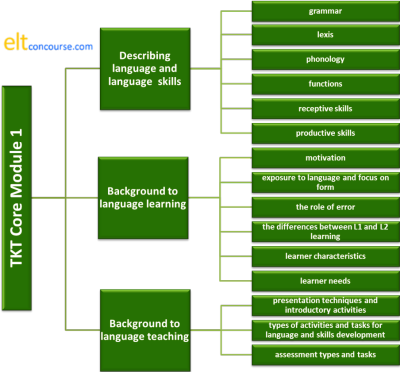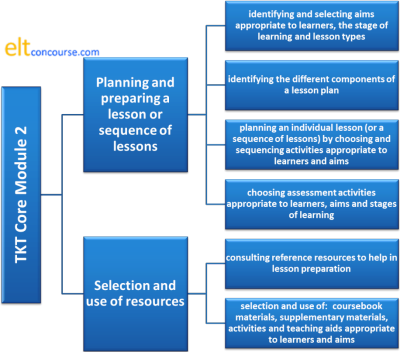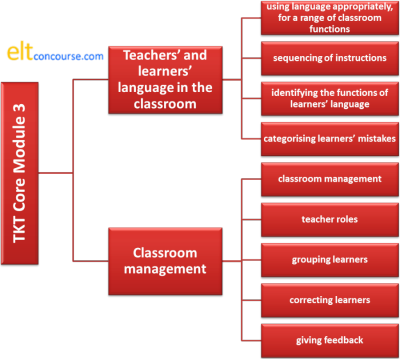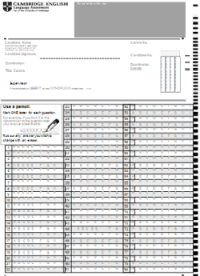Welcome to the free Teaching Knowledge Test course
 |
The overview of Teaching Knowledge Test (TKT) Core Modules 1, 2 and 3 |
This preparation course covers the three core modules of the Teaching Knowledge Test administered by the University of Cambridge. There is a free Study Companion to go with the work on the website. Get it by clicking here.
You can, of course, simply use the practice exercises on this site without following the course (or any course). You will then be wasting most of your time because testing yourself is not the same as learning.
 |
What is TKT? |
TKT is a modular course which is assessed via a paper-based
examination. There is no practical teaching assessment.
As well as the course on this site, a large number of institutions
worldwide offer face-to-face courses to prepare you for the
examinations.
You are not obliged to take a face-to-face course to enter the
examinations. You can do that at any Cambridge Open Centre.
In Cambridge's own words:
TKT shows how you are developing as a
teacher. It is ideal for people who want to prove their teaching
knowledge with a globally recognised certificate.
With TKT, you show employers that you:
are familiar with different teaching methodologies
know how to use teaching resources effectively
understand key aspects of lesson planning
can use different classroom management methods for different needs.
Source:
http://www.cambridgeenglish.org/teaching-english/teaching-qualifications/tkt/
 |
The overview
This page contains the overview of the course and the TKT itself. From here, you can navigate to any other part of the
course or simply begin and follow where we lead. |
|||||||||||
|
On this page, and in the Study Companion, you will find information about:
|
||||||||||||
 |
What is in the three Modules?TKT has three core ModulesYou can click on the diagrams below to go to the index for the Module you want. |
 |
Module 1: Language and background to language learning and teaching |
 |
Module 2: Lesson planning and use of resources for language teaching |
 |
Module 3: Managing the teaching and learning process |
To come into Band 4, you will need 70 out of 80 possible
marks (87.5%). To come into band 3, you will need
45-50 marks out of 80 (56.25-62.5%).
We'll give you plenty of practice as we go along. Many
of the practice tests are based on the formats you will
find in the real examination.
TKT pass rates
Worldwide, the figures look like this*:
| Pass Band 4 | 10.5% |
| Pass Band 3 | 61.4% |
| Pass Band 2 | 25.5% |
| Pass Band 1 | 2.5% |
You should be aiming for at least Band 3 and this course is intended to help you do even better than that.
Examination tips

Before the examination:
During the examination:
 |
How do I use this course? |
Should I follow the guides in order?

Yes. If you are new to TKT, follow the guides in order
starting with the beginning of Module 1 (grammar) and finishing at
the end of Module 3 (giving feedback).
Each part of the course is written on the basis that you have
followed the previous parts.
If you are coming to this guide for some extra work and revision,
you can take the guides in any order.
What if I don't understand something?

You can:
What equipment do I need?

You'll need to read and take notes in many of the guides because
they have tasks for you to complete. If you do not do the
tasks, you will not learn as much or engage with the materials.
A printer will be helpful for some guides but you do not need one.
What resources do I need?

If you follow this course carefully and also read other guides on
this site which are linked to it, you will have everything you need
to pass TKT. No further reference materials or
activities are needed.
You may find the Study Companion helpful.
That does not, of course,
constitute a guarantee!
In addition:
| The TKT course Study Companion | This booklet includes some of this introduction and self-test questions (with a key) for each Module of the TKT. |
| The TKT Glossary | This is a list of terms and concepts useful for TKT on the Cambridge website. Download it before you start and refer to it as you go along. |
| The TKT Glossary crosswords | A set of 15 crossword puzzles to test you on the words in the glossary. |
| Cambridge English TKT | The general information page for TKT on the Cambridge site. |
| A short course in language analysis | This course covers phonology, morphology, lexis, phrase- and clause-structure, sentences and text structures. |
| The index page for initial training | This section contains guides to language, skills, theory and more for less experienced or inexperienced teachers. |
| The index page for more experienced teachers | This section contains guides to language, skills, theory and more for more experienced teachers. |
| Search this site | Use these links if you are looking for something special. |
| The A-Z training index | This is a list of all the training subjects on this site. |
| Learn to transcribe | This is a short course to help you learn how to transcribe the sounds of English. |
How do I revise?

The really simple way is to do the course again!The other ways are to follow these links.
|
There are short revision courses for all
three Modules. Do not do these until you have followed the course for the Module. |
||
| Module 1 revision | Module 2 revision | Module 3 revision |
|
You can repeat all the tests and exercises
in each Module. Do not do this before you have finished the course for the Module |
||
| Module 1 tests | Module 2 tests | Module 3 tests |
| When you have done the course and the tests, including the ones in the Study Companion, try a full practice examination. | ||
| Module 1 practice examination | Module 2 practice examination | Module 3 practice examination |
| If you like, you can also test yourself on the words in the glossary with: | The glossary crossword puzzles | |
To start your course:
Click on the diagrams above
or
use this menu: |
||
| Module 1 Course | Module 2 Course | Module 3 Course |
| The Study Companion | ||
Good luck with the course!
If you have any comments and suggestions, please send them to ELT Concourse using the Contact link below.
*Source: www.cambridgeenglish.org/research-and-validation/quality-and-accountability/grade-statistics/2016/





